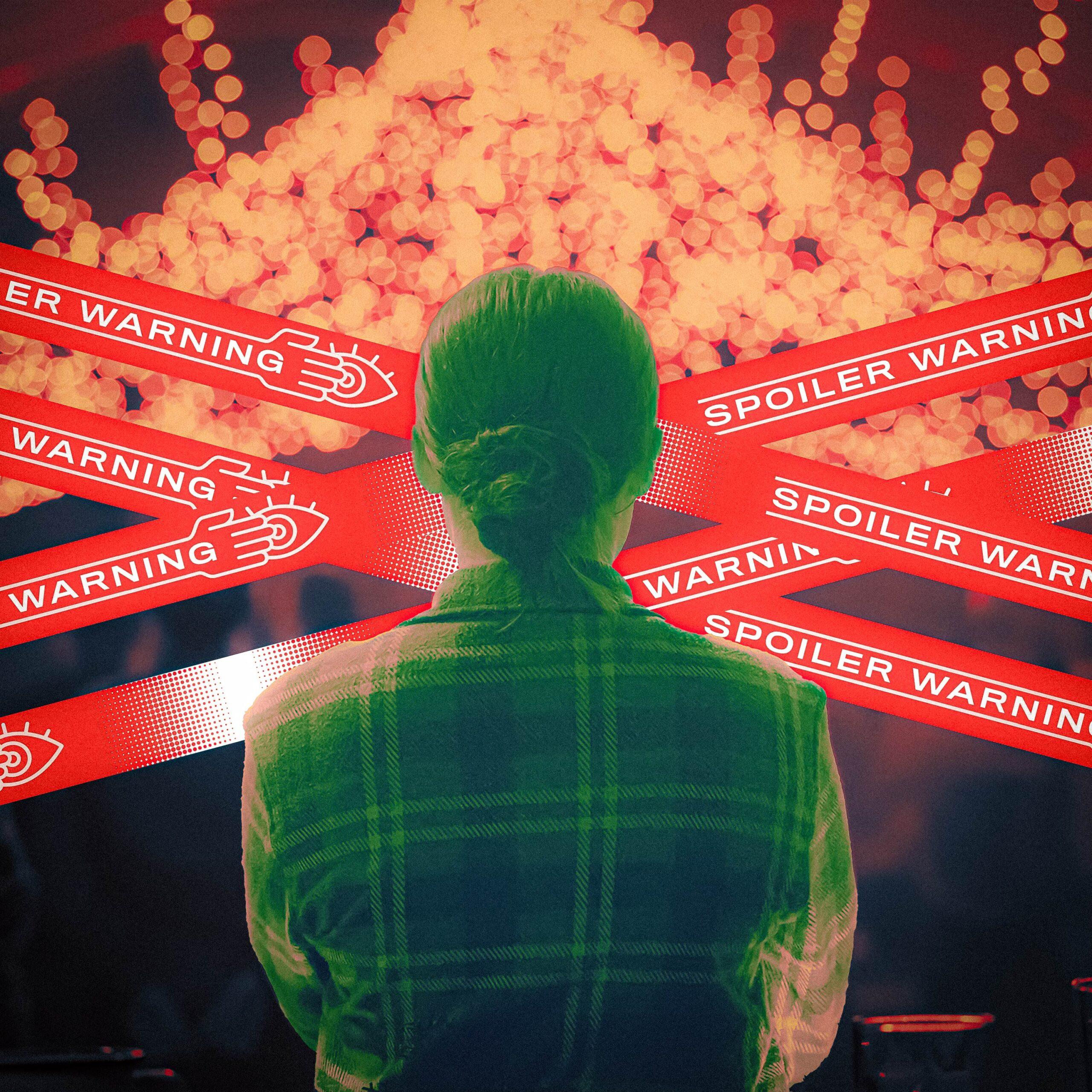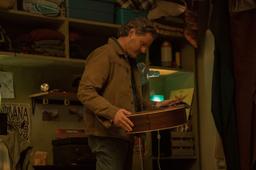What Does Spoiler Culture Look Like Now? ‘The Last of Us’ Is Where We Find Out.
Season 2 of the HBO adaptation is speeding toward a reveal that could become a cultural flashpoint. What to do when millions of people already know about it?
Editor’s note: This story does NOT contain spoilers for The Last of Us Season 2.
No one is talking to me about what I know is going to happen in the new season of The Last of Us. What they know is going to happen in the new season of The Last of Us. This is awkward, because I've known about this thing for five years now—maybe you have, too, if you're one of the 10 million–plus people who played The Last of Us Part II, or one of the countless more with access to the internet and less access to patience. But about 10 seconds into a press event with the cast and creators of HBO's The Last of Us, it's extremely obvious: They're not going to talk about what we all know is going to happen in this show.
Adaptation is an art unto itself; there's no one right way to do it. The same goes for marketing said adaptation. The story is out there; what do you do about that? All answers are fair, but some approaches can look goofier than others. I asked Craig Mazin, The Last of Us’s cocreator, about this—whether there was ever a world where he considered just being up-front about the buzzy events that kick off the sequel game, whether he would ever go full Shakespeare with it and relish the telling more than the mystery. He had an interesting response.
"I think that the presence of the story out there is generally an overrated thing. We think that everyone knows everything. It's actually quite remarkable how many people don't," Mazin said. "I made a show about Chernobyl—who didn't know that Chernobyl blew up? It didn't matter. James Cameron made Titanic. Who didn't know how that ended? It doesn't matter. That's not why we go to things."
Very good, very fair. No adaptation should have to labor under the specter of its source material in every moment. But The Last of Us is interesting because Mazin is so incredibly reverential toward the source material, even as he and original game writers Neil Druckmann (who also cocreated the show) and Halley Gross make small additions to it in Season 2. Mazin’s aware that there are many people who might be experiencing this story for the first time, and he’s made the decision, alongside everyone else involved, to treat the plotting of the show as a surprise … to indirectly categorize a popular video game, and the many hours of YouTube videos and written content about it, as spoilers.
But can you even control that sort of thing anymore? Does it even matter?
Shortly after Game of Thrones premiered on HBO in April 2011, the editors overseeing The A.V. Club's robust and influential TV recaps coverage made a novel decision: They would recap every episode of the show twice. Once for people who had read the books, and again for people who had not. Different writers handled each recap, and the rules were very clear: The "expert" recaps welcomed informed discussion from commenters, including about events that had not yet happened on the show. On the "newbie" recaps, spoilers were verboten. You were expected to be along for the ride, week to week.
This was, to me, the platonic ideal of pop culture discussion, a simple funnel sorting people according to how much they wish to know. Unfortunately, it'll never work like that again. Irreversible shifts in the media environment (arguably best signified by Game of Thrones coverage) meant fewer and smaller publications for fans to gather round, social media's splintering means we're no longer posting in many of the same places (or even formats), and the sheer number and cadence of streaming-era shows means that it's no longer reasonable to expect many others to watch something at the same time as you.
Game of Thrones is still a useful comparison because, while the scale is quite different, The Last of Us is HBO's biggest hit since Thrones and the second time the network has spun prestige TV gold out of a beloved genre niche. It's also useful because The Last of Us is speeding toward an absolute brick wall of a spoiler that, when combined with this level of popularity, is the sort of thing that can become a cultural flashpoint (like Ned Stark's death in Season 1 or the Red Wedding in Season 3 of Game of Thrones).
People were polite about Game of Thrones’ biggest spoilers in a way that was both charming and, at times, organic. A Song of Ice and Fire book readers discreetly recorded videos of their less savvy friends witnessing the Red Wedding for the first time, cementing a pattern the show began with its first season. The big, dramatic thing that other shows would do in their season finales? Game of Thrones would do ’em in the penultimate episode.
It will be fun to see whether this phenomenon repeats itself when The Last of Us gets to its next shocking moment, but it won't hit the same. What made Game of Thrones so effective at stunning viewers wasn't just the shocking nature of its plot but how it broke with TV tradition. Even in the anything-goes realm of HBO, TV still kept to a recognizable shape: Main cast members would stick around for the majority of the show, deaths were shocking and rare, and the scale stayed small and manageable, mostly for budget reasons. HBO's commitment to a reasonably faithful adaptation of George R.R. Martin's work meant that those rules could be bucked. TV changed forever; there's no longer any mold to break.
That doesn't mean people don't care about spoilers. There's a wrinkle here when it comes to The Last of Us: It's based on a pair of video games. And video games, both as an industry and as a subculture, are downright maniacal when it comes to spoilers.
Because of video games’ interactive nature, "spoilers" are quite expansive, encompassing much more than plot twists. Developers and players place a premium on a sense of discovery, on learning all the things a game has to show you for yourself. This can make it very difficult to discuss a game, especially when publishers impose byzantine rules on coverage in exchange for early access.
The result is that it can be difficult to have any sense of proportion, to know what might be a major or minor spoiler, because the intent of a work isn't what we argue about when we discuss spoilers in games—it's the imagined, perfect experience a player might want to have. It would be nice, for example, if you didn't know Marion Crane died partway through Psycho, but it wouldn't ruin the film for you—there's still a lot of movie after her death. It's much more impolite to tell a first-time viewer of The Sixth Sense that Malcolm Crowe is dead the whole time because the entire film builds to that. Some may argue that both spoilers are just as bad, and that's understandable, too. We're talking about plot twists, moments that change your understanding of a story. It makes sense to want to have those moments preserved.
Things get trickier in a video game, where a very basic question—who do you play as?—can be a loaded one. In the lead-up to The Last of Us Part II's release, Sony and the developers at Naughty Dog worked hard to obscure the ways in which the game would play out—I reviewed it at the time, and I was not permitted to mention the specific ways its structure deviated from the first. These pivots in perspective are very much the point of the game, but any discussion of them was ultimately restricted.
And when discussions of those spoilers do become fair game, you don't get to pick which fans set the tone. Video game fandom has long been plagued by people who take a hostile or reactionary stance toward developers or their creations. The Last of Us Part II, while effusively praised by many fans and critics, wasn't exempt from this. For a time, the game became something of a nightmare to discuss, as the usual suspects emerged to gin up outrage over, for example, a major new character's physique. Would that still have happened if this new character wasn't a secret? Almost certainly. But it's also one of the first things about this character that people encountered—hateful criticism instead of thoughtful commentary on the admirable way she subverted expectations—and that’s almost certainly worse.
The spoiler logic of video games has escaped containment, as almost all major pop culture releases have adopted a strict policy of information control: More than a decade after the MCU inspired Hollywood to give itself an IP-fueled makeover, studios and the fandoms they cultivate are most interested in potential. What movies might be carried forward, and what characters might be featured in them? How much will dedication to past releases be rewarded? As with games, the movie or show itself isn't what the hype is meant to serve. It's some idyllic, imaginary fan who wants to discover everything there is to know, but only at the exact right time.
There's irony in this, as the way pop culture is talked about online could not be more open in 2025. Twitter's devolution to X has diminished its value as an imaginary watercooler (itself an increasingly archaic image) and whatever loose etiquette its users adopted. On TikTok, the default assumption is that the viewer is engaging with the same things that the content creators are. Just look at a few random TikToks posted immediately after the White Lotus Season 3 finale. No one's really concerned about whether or not you've seen the show. It feels different from the blog-and-tweet era of TV discussion, when everyone was communicating in text and in the same digital location. If you offended my spoiler sensibilities, I could let you know in a comment or tweet that others would see, with little effort, and they could decide to avoid the original post. On a platform like TikTok, comments are less prominently displayed, and if I really wanted to engage, I'd have to make my own ’Tok in response. That’s a lot of work!
The environment is different. TikTok's algorithmic feed is part of the appeal—experienced users often tell newbies to “train the algorithm”: Browse hashtags, like videos, tell the machine what you want it to give you. Short-form video, be it on YouTube Shorts or Instagram Reels, comes with a level of buy-in that scrolling a feed of text does not.
The Last of Us Season 2 is bringing us to uncharted territory in video game adaptation: This big spoiler it's driving toward is one that entirely hinges on the unique relationship between a game and the person playing it. The adaptation itself will be a subversion of the medium's unique dynamics. And I am genuinely curious to see how it will play out.
Video games are only just now getting faithful adaptations that attract people who do not play them—Mazin tells me that he loves hearing that his show inspired people to check out the games it's based on and other video games more broadly. He, along with Druckmann and Gross, see themselves as vanguards of a sort, demonstrating to the non-gaming public how sophisticated the medium has become.
Season 1 of The Last of Us proved that the characters a player connected with could stand just fine without a controller propping that connection up. But the second game, the one the new season is diving into, tries to do much bolder, uglier things with the characters the player controls, things that were novel in games but less so in other media. I asked Mazin about whether he felt anxiety about the empathy shortcut that games, but not necessarily TV, provide.
"Part of me is envious, and part of me thinks we have it better," Mazin said. "It may take us a little bit longer, or it may be a little bit more complicated for us to create empathy with a character when we're simply absorbing something passively. But I think we can go a little bit deeper at times in our medium, because maybe it takes a little bit longer, because you feel like, 'Oh, this had to blossom quite a bit,' as opposed to almost happening immediately."
The question that The Last of Us Season 2 will be answering for some is a fascinating one: If you watch this show first, and then play the game, how differently will each hit? There has been no other adaptation of a video game this lavish, this adult, this popular. The first game, with its relatively conventional story, has no left turns as hard as the ones ahead in Season 2. Future spoiler scholars can create reams of content on YouTube and in comment sections, wondering whether it's better to preserve the surprise for the show or for the game. There can be a spoiler only once.


